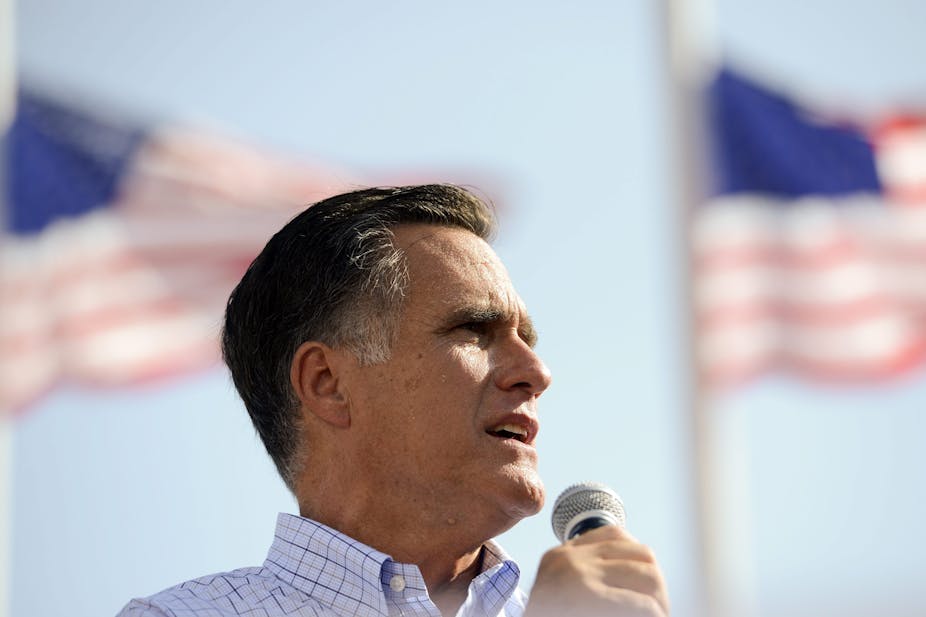After the success of the Democratic National Convention, with its barnstorming speeches from former President Bill Clinton and First Lady Michelle Obama, Mitt Romney’s performance at his convention can be considered more closely
In his acceptance speech, Romney made his pitch to swing voters by claiming that if they feel disappointed then it is time for a new US president.
In marketing terms this is a pretty savvy line. However, the problem for Romney is that the large contingent of disappointed Obama supporters simply aren’t that taken by the former Governor of Massachusetts.
Romney has two big problems: his personality and his policies. If you consider this a particularly harsh judgement, spend 40 minutes watching his acceptance speech.
The speech largely attempts to address a number of gaps: Romney’s likeability gap in the polls compared with Obama, his empathy gap in the same polls and his party’s significant gender gap (women voters in America are increasingly turning against the Republican party). He also needed to address his biography gap (his reluctance to talk about his past). By the time he finished dealing with his credibility in his convention speech, there was little time left for policies.
Romney’s life and family look picture perfect. That’s not necessarily a positive for him: it can make him seem like the Hollywood version of an American president, reinforcing the view that Romney is a hollow man. These credibility gaps are hard to overcome because they stem from Romney’s unwillingness to talk about two central elements of his character – his Mormon faith and his business career.
Mormons are generally reluctant to talk about their personal lives and the inner workings of their church, as this is discouraged by Mormon leaders. Surveys show that non-Mormons are suspicious of the religion. Many Christians don’t consider it a Christian religion and many non-believers think it to be especially weird.
Americans do consider Mormons to be hard working, successful and patriotic but many won’t vote for a Mormon with polls clearly showing that a Mormon candidate would face more discrimination from voters than someone from an African-American background. As a result Romney keeps quiet about his faith.
The most repeated cliché about Romney is that he is risk adverse. However, a career as a venture capitalist isn’t exactly punching a clock in a life time guaranteed job. Bain Capital, the firm Romney co-founded and led from 1984 to 2002, took many risks with other people’s money, businesses and jobs but, conversely, Romney and his partners were very good at what they did and earned millions to prove this.
Nonetheless, Bain’s practice of picking winners and losers often left a trail of destruction. If things worked out it created jobs and helped expand businesses; when things didn’t go well companies like the KB Toys chain were saddled with debts that Bain had borrowed with little direct liability. The bankruptcy of some of Bain’s acquisitions has created many unhappy former employees who have featured in rival Republican and Democrat ads this year. So it is risky for Romney to talk about his business career, especially in a time of high unemployment and when high flying financial companies are still (not unfairly) blamed for America’s ongoing economic woes.
The Obama campaign will therefore argue that Romney is a corporate raider who is committed to bringing back the bad economic ideas of George W. Bush whose legacy was the 2008 financial crisis and its fallout. Is Obama any better? Surprisingly for such a charismatic speaker, Obama has his own empathy problem. This logical decision maker is often seen as no longer cool but just cold and not really understanding of the public’s pain. Obama’s style has a certain aloofness that he has worked at overcoming since his party’s shellacking in the 2010 mid-term elections.
Romney’s convention speech has been criticised by Obama in recent days for being light on policy; if you make that charge you need to have your own ideas and policy achievements to promote. What are these likely to be? Obama will talk up killing bin Laden, ending the war in Iraq and recently starting to withdraw troops from Afghanistan. These were topics Romney’s speech almost entirely avoided, making this the first time in a generation of presidential elections that a Democrat is more trusted with foreign policy than a Republican.
Unfortunately for Obama, the election will be won or lost almost entirely on domestic issues and this means at this week’s convention he will attempt to make the election as much as possible about Romney, not about the troubled US economy. However, he cannot avoid talking about what he has done to save the economy from being worse and what his administration has done to make it better.
He will promise growth and jobs in the years ahead; and argue the signs of progress can be seen. Obama can point out that Romney’s ideas might well increase unemployment but his problem is his own administration’s less than impressive record on creating jobs and economic growth.
Clearly there is only so much a president can do, but that message is not one the public is particularly interested in hearing.
This means Obama will be reduced to changing his 2008 message of hope and change to one in 2012 that evokes hope and fear of what a Republican presidency will do.

